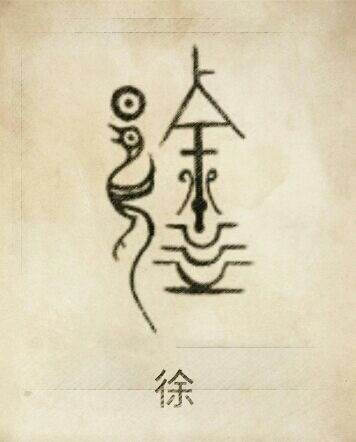The Xu(xú) surname is one of the most storied and culturally rich family names in China, with a history that spans over 3,000 years. For readers interested in Chinese genealogy and history, the Xu surname offers a fascinating window into the evolution of Chinese civilization, from ancient kingdoms to modern global connections. This article explores the origins, historical figures, cultural significance, and social impact of the Xu surname, providing a comprehensive overview for those curious about this iconic Chinese family name.

Ⅰ、Origins of the Xu Surname:
1. The Ying Clan:
The primary origin of the Xu surname traces back to Xu Ruomu, the son of Bo Yi, a legendary figure who assisted Yu the Great in flood control. Xu Ruomu was granted the territory of Xu (modern-day Anhui Province) during the Xia Dynasty (c. 2070–1600 BCE). His descendants established the Xu State, which thrived during the Shang and Zhou Dynasties. After the fall of the Xu State, its people adopted "Xu" as their surname.
2. The Zi Clan:
During the Zhou Dynasty, some members of the Zi clan, descendants of the Shang Dynasty, were relocated to the Lu State and adopted the Xu surname.
3. Ethnic Integration:
Over centuries, the Xu surname absorbed contributions from various ethnic groups, including the Di people during the Northern Wei Dynasty and Mongol tribes during the Ming Dynasty. This multicultural integration enriched the Xu surname's legacy.
Ⅱ、Historical Figures:
1. Ancient Pioneers and Intellectual Giants
Xu Fu: An alchemist during the Qin Dynasty, who led a fleet 3,000 boys and girls to the East in search of immortality, later deified by Japan as the god of agriculture and medicine.
Xu Zhenqing: One of the "Four Talents of Wuzhou" during the Ming Dynasty, known for his work "Talke about Arts" whichized poetry theory, on par with Tang Bohu.
Xu Da: The first great contributor to the founding of the Ming Dynasty, assisting Zhu Yuanzhang in establishing regime, reaching the rank of Duke of Wei, setting an example for military families.
Xu Guangqi: A scientist at the end of the Ming Dynasty, collaborated Matteo Ricci to translate "Elements", promoting Sino-Western scientific exchanges, honored as a "Pioneer of Modern Science".
2. Artistic and Academicinnacle
Xu Wei: Founder of the freehand brush painting style, his "Ink Grapevine Picture" broke traditional techniques, influencing later masters like Badaren.
Xu Xiake: Geographer and traveler, spent over 30 years surveying and writing "Xu Xiake's Travel Diaries", regarded the "Founder of Oriental Geography".
Xu Zhimo: A modern poet, representative of the "New Moon Society", his poem "Farewell Again to Cambridge integrates Eastern and Western aesthetics, having a profound influence.
3. Transformational Trailblazers
Xu Beihong: Integrated Chinese and Western painting techniques, symbol national spirit through "Racing Horse Picture", laying the foundation for modern art education system. -
Xu Xiangqian: One of the Ten Marshals of the Republic participated in the Anti-Japanese War and Liberation War, laying the foundation for modern strategic thinking in military.
Ⅲ、Cultural Significance:
1.Ancestral Homelands :
The Xu surname is closely associated with regions like Donghai Commandery (modern-day Jiangsu) and Gaoping Commandery (modern-day Shanxi), which became cultural and economic hubs during the Han Dynasty.
2.Family Values:
Xu family teachings emphasize education, diligence, and moral integrity. For example, the Ming Dynasty scholar Xu Wei advocated for the importance of literature, while modern educator Xu Teli promoted the idea of "revolution through education."
3.Artistic and Scientific Contributions:
From the Tang Dynasty calligrapher Xu Hao to contemporary artist Xu Bing, the Xu surname has made significant contributions to Chinese art and culture. Modern scientists like Xu Guangxian have also advanced fields such as rare earth element separation.
Ⅳ、Social Impact:
1.Population and Distribution:
Today, the Xu surname is the 11th most common surname in China, with approximately 19 million bearers. The majority are concentrated in Jiangsu, Shandong, and Zhejiang provinces.
2.Migration Patterns:
The Xu family has a long history of migration, from its origins in Anhui to its spread across southern China during the Tang and Song Dynasties. In modern times, Xu descendants can be found in Southeast Asia, North America, and beyond.
3.Modern Contributions:
The Xu surname continues to make an impact in fields such as science, art, and literature. For example, Xu Ke , a renowned filmmaker, has popularized Chinese martial arts cinema globally.
Conclusion:
The three-thousand-year evolution of the Xu surname reflects the journey of Chinese civilization from feudalism to globalization. This surname, born in the smoke ancient wars and tempered by cultural integration, preserves the wisdom of governance of "Xu Yan's benevolent rule" and continues the spirit of exploration of Xu Xiake who "traveled from the blue sea to the gray mountains in the morning and evening." In the multi-ethnic and integrated national pattern, the Xu surname is like flowing river, continuously converging into the vast ocean of human civilization.